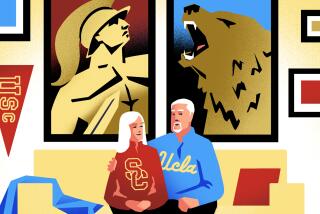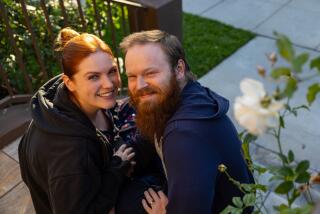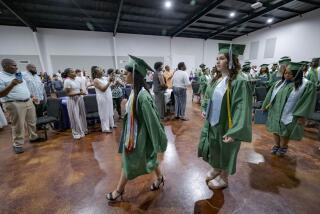Mom’s a Bachelor : Widow Gets College Degree 49 Years and 13 Children After High School
- Share via
Margaret Kozeluh’s middle name is LaVerne. It should be Perseverance.
Kozeluh began having children in 1940, when she was 20, and didn’t stop until she had her 13th in 1958.
She took her first college course in 1938. Now, almost half a century later, she has her degree.
For 49 years, Kozeluh, a Carson resident, balanced the arduous task of raising her large family and working a full-time job with attending classes, writing term papers and cramming for final exams. She had to struggle against the academic bureaucracy and competition from classmates many years her junior.
Interruptions lasted for decades, but slowly, course by course, she accumulated the credits and the grades to graduate as a solid B student.
The result, a diploma from California State University, Dominguez Hills, arrived in the mail last month.
“What did I get out of it? I majored in cultural anthropology. It is a good idea to know your fellow man, to know about other cultures,” Kozeluh said. “I have to say it has been lots of fun.”
To any suggestions that her accomplishment is rare, Kozeluh retorts that she is just an ordinary person, not worthy of any special fuss.
“I think it is embarrassing,” she said. “There are so many more deserving people.”
Confided her daughter Jodell Vann: “She’s always putting herself down.”
Her children, all of whom are grown, thought she at least deserved a surprise party last weekend.
Object of Admiration
Kozeluh has become an object of admiration at Cal State, too, particularly among the older students, said Suzanne Gemmell, vice president for student affairs.
“They look in awe. ‘How do you do all this?’ Somebody who perseveres the way she has, has a real achievement that ought to be recognized.”
No one at the college can remember anyone like her.
Born Margaret LeGros in 1920, she grew up in Chicago, graduated in 1938 from the Sacred Heart Academy in nearby Lisle, Ill., and took an English course at Lyons Township Community College. About the same time she married John T. Kozeluh, a distant relative.
The next college course she took was at El Camino College in 1962.
In between, the children arrived--boys whose names began with T, girls with names beginning with J. Tom was born in 1940, Terry in 1942, Judy in 1944, Jackie in 1945, Jill in 1947, Janice in 1948, Tim in 1949, Julie in 1951, Jodell in 1952, Jolene in 1953, Jerilyn in 1956, Ted in 1957 and Todd in 1958.
“We never talked about the size of the family. That is a kind of religious thing as far as I am concerned,” said Kozeluh, who is a Roman Catholic.
She and her husband both came from large families. She is the third of six children; there were eight children in his family.
Kozeluh’s husband, who died in October, helped with baby care. “Babies cry out at night and when I found out that he would get up in the middle of the night and take care of it . . . I relied on that quite a bit,” she said.
Their first home in California--when they arrived in 1951 with eight children--was a two-bedroom house in South Los Angeles. The boys slept on the porch. One of the babies slept in the kitchen.
Her husband worked in the aerospace industry, but money was tight.
“You don’t have money when you have kids,” Kozeluh said. She took a job to make ends meet.
Several years and two more children later, the whole brood rode around in an old Model A Ford. “It was the only thing we could afford,” she said. “People would look. Those were the days before you had to have seat belts.”
The family consumed two gallons of milk a day. A favorite--and inexpensive--meal was corn chowder, a mixture of creamed corn, mashed potatoes, onions and milk. Frequently it was all there was.
She was even on “Queen for a Day,” the old television show where contestants poured out their problems and audience applause determined who would get help.
At the time, her dentures were being repaired and the bill was $3.50. “I didn’t have it, so I said I needed to get my teeth out of hock and a new water tank,” Kozeluh said. She got both.
After Todd was born, Kozeluh, who was 40, had an operation for medical reasons that prevented her from having more children. But she still wanted more.
“She sat us down,” said Vann, “and asked us how we would feel if she took in foster children. My father put his foot down. Thirteen children was enough.”
Kozeluh decided to return to college after her son’s first-grade teacher threatened to flunk most of the youngsters in the class, including hers. She said that she figured she could teach just as well as the teacher if she had a degree. Besides, her children, who were growing up, were driving her “stir-crazy. . . . My husband started giving the kids (household) jobs, so I figured, ‘They don’t need me any more,’ ” she said.
She was working the graveyard shift at Frito-Lay Inc. in Los Angeles and had to go straight from work to class at El Camino College.
She fell asleep once in a music class, waking with a start just as the instructor was saying: “All those dozing off because they have been watching television all night will get an F.” He relented after hearing about her schedule.
After three years of courses at El Camino, she laid off college for more than a decade. She had begun working in the Gardena personnel office of the Los Angeles Unified School District.
In 1977 and 1978, she returned to school, this time at Harbor College. By then, she and her husband were living in a five-bedroom house in Carson.
She also took television courses at Coastline Community College through the educational station KOCE from 1977 through 1980. Her husband taped them so she could listen if she missed a class. On weekends, she would try to watch repeats. “Sometimes, I would sit all day Saturday and catch up,” she said.
In 1980, she entered Cal State Dominguez Hills, where she could accumulate the upper-level credits needed for a bachelor’s degree.
“At first I felt isolated. I was so much older,” she said.
But she soon realized that she could hold her own.
“When I went to school, we were taught how to study,” she said. “These young kids, they have the world by the tail and they don’t know the world from a hole in the wall. On one test, they came in sauntering and talking about the latest party. They got low scores and I got one of the highest scores.”
One year, she said, she got five As and a C.
“That gave me heart. I knew I could compete. It made me feel like a normal person. . . . When I got a C, I wanted to quit going. There is no excuse for that,” she said.
She had to choose a major, and anthropology was a strategic choice: The building where anthropology classes were held was closest to her parking lot.
“I worked until 2 p.m. Classes started at 2 p.m. I didn’t want to walk too far, so I took anthropology. I liked it very much,” she said.
Cal State’s Gemmell commented: “That is probably as good a reason as any. She did very well in anthropology courses.” Most of her anthropology grades were A’s.
She has since applied analytical skills learned in anthropology to compare her 13 children to the national norm. She concluded that they did not advance educationally as much as she would have liked but that they have more stable marriages and steer clear of trouble with the law more than average.
Only one has a college degree; one, who had a history of crime, died in a shoot-out with police; two divorced and remarried.
“By the averages, you would expect (half of the) children to have some encounter with the law. I only had one, my oldest son. . . . He was a very angry boy,” she said. “There is only one college graduate. That angers me. I don’t know how any of them could miss the boat. I even held out some bait: They could live at home, didn’t have to help out mom and dad, but the minute they stopped (going to college), they had to get a job.”
Kozeluh finished her course work last summer and actually went through the graduation ceremony then. Her husband, too ill with emphysema, “never made it to the graduation,” she said.
But the administration held up her degree for months while it pondered whether a new state requirement for a math test applied to her. In December, two months after her husband had died, she was officially awarded her degree without having to take the test. Even then, it took another seven months for her diploma to arrive.
Now that she has it, Kozeluh, 67, who recently retired from her job, is wondering what to do.
“I wish I knew,” she said.
She might take a course or two, she said.
“Maybe something in geriatrics.”
More to Read
Sign up for Essential California
The most important California stories and recommendations in your inbox every morning.
You may occasionally receive promotional content from the Los Angeles Times.













